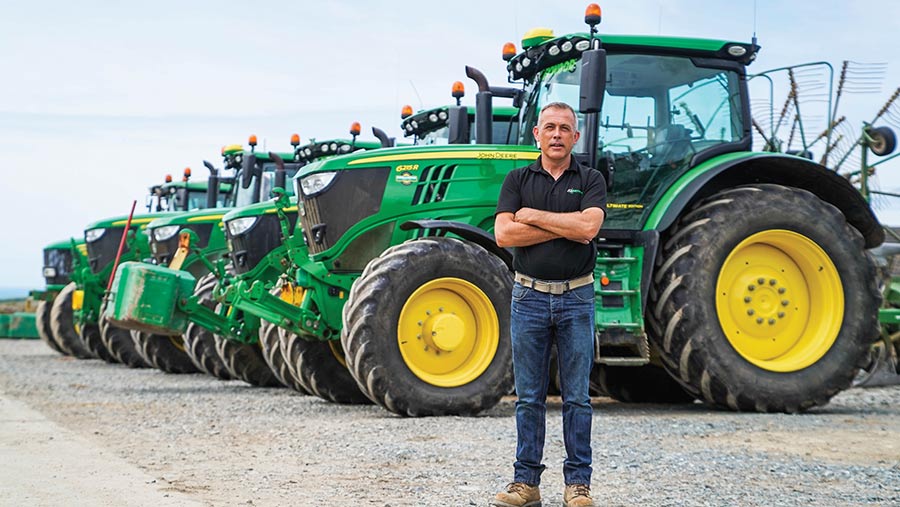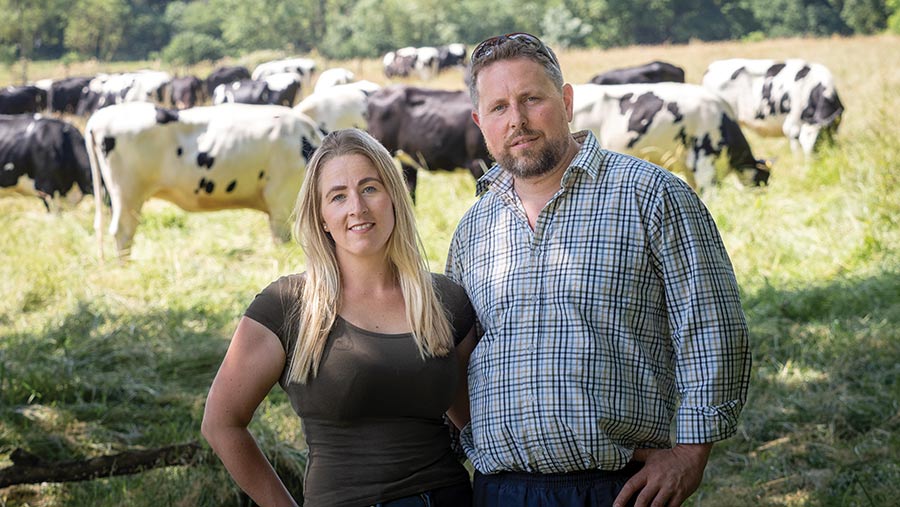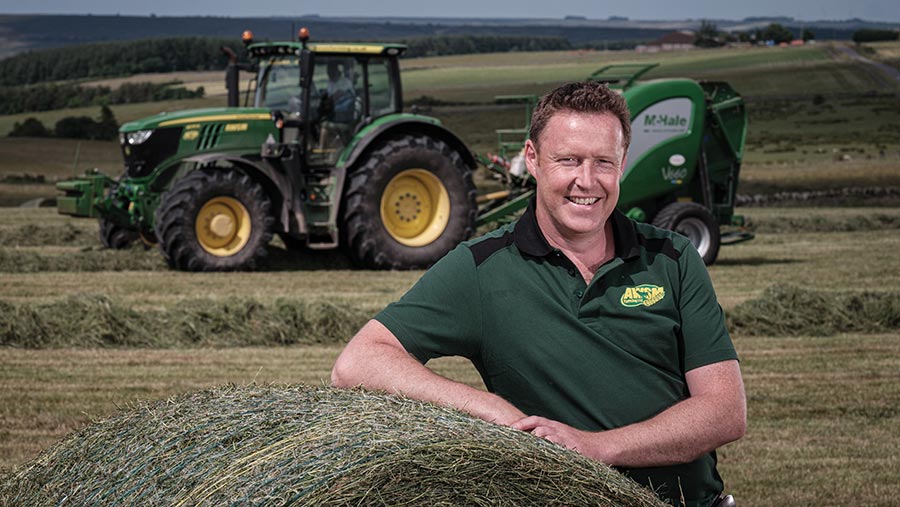Farmers Weekly Awards 2023: Contractor of the Year finalists

The finalists showed a keen eye for detail, considered investment plans and a focus on staff management – the hallmarks of three very different businesses jostling for this year’s Contractor of the Year title.
See also: What’s in Your Shed? Contractor of the Year winner Martin Hays reveals all
The finalists:
AJ Heywood & Sons
Springfield Meadow, Cornwall
AJ Luke Contracting
Barrow Hill Farm, Somerset
AWSM
Lane Head Farm, Yorkshire
The judges:
Martin Hays
Last year’s winner
Oliver Mark
Farmers Weekly machinery editor
Jill Hewitt
Independent judge
AJ Heywood & Sons
Springfield Meadow, Bude, Cornwall

Kevin Heywood, AJ Heywood & sons © Emily Fleur
Fact file
- Primary services: Mowing, raking, baling, forage harvesting, slurry and muckspreading, cultivations and drilling
- Main customer base: Dairy farms
- Area covered: Up to a 15-mile radius from Bude base, across north Cornwall and west Devon
Brave investments in the latest forage harvesting and slurry spreading technology have given Kevin Heywood’s customers greater insights into their businesses than ever before.
His maxim “we measure it, so customers can manage it” reflects this approach of providing with detailed data to inform future cropping decisions.
In 2010, four years after taking the reins from his father, Kevin broke new ground in the South West by becoming the first to invest in John Deere’s Harvest Lab system.
This allowed his customers to view silage dry matter, sugar levels, protein and yield in a completely new way.
Despite some contractors scoffing at the technology at the time, and others questioning its cost benefit, the venture has proved invaluable in retaining existing customers and attracting new ones.
AJ Heywood & Sons now runs a pair of Harvest Lab-equipped Deere foragers alongside two ejector trailers with weigh cells. This means the yield monitors can be regularly calibrated to ensure readings are accurate.
Six years ago, the business took another step forward by branching into the competitive slurry sector.
As with grass harvesting, the addition of technology helps the Heywood offering stand out from the rest, with tankers and umbilical applicators featuring sensors to monitor nutrients such as nitrogen, potassium and phosphorus.
In doing so, this allows his customers to exploit a cheap but valuable commodity, ensuring applications are effectively and accurately targeted to produce strong silage yields.
Machinery
Most machinery is purchased new, but to manage rising prices, the business has opted against long-term breakdown cover in favour of the standard 12-month warranties.
The inherent risk in this approach is softened by the employment of a full-time mechanic, who is able to complete all servicing and most repairs in-house with support from a recently acquired engineering division.
This also allows some parts to be machined on-site, reducing downtime in the process.
Aside from regular maintenance, the workshop has been put to good use developing a home-built, trommel-style mobile slurry separator.
Rather than a screw press, which would quickly wear given most customers bed on sand, the design was based on the workings of a washing machine.
Different size meshes can be fitted to remove the solid element of the slurry, reducing the volume by 30%. In doing so, it can potentially save dairy farmers that are short of storage capacity from building new lagoons.
The nitrogen-rich dirty water can then be used to fertilise and irrigate fields, with the solids spread in the spring or autumn.
This eliminates the risk of excessively stodgy slurry baking in bands on the ground before eventually being raked up and put through the forager.
Staff and customers
The business employs 20 full-time staff across the agricultural contracting and farm-based groundworks divisions, and another 10 during seasonal peaks.
Inevitably, the growing workload has forced Kevin, albeit reluctantly, off the forager seat and into the office.
But he still finds time for the occasional stint, giving him a chance to catch up with customers and map out future plans.
These discussions are based on the data provided by the forage and slurry sensors.
To do so, he helps customers sign up to John Deere’s Operations Center, allowing them to view the information as soon as the forager leaves the field and compare it with previous years to assess annual performance.
What the judges say
Early adoption of new technology has been central to AJ Heywood & Sons’ success, supported by an on-site mechanic and engineering division that keep the wheels turning.
AJ Heywood & Sons summary
The numbers
- 50 customers
- 44 years in business
- 12 full-time members of staff
The judges liked
- Applies technology to add value to traditional services, particularly in improving slurry spreading accuracy
- Provides customers with insights to guide crop management decisions
- Innovative slurry separator will reduce storage burden for customers
- Engineering division has cut repair and maintenance costs
- Year-round workload keeps staff busy and business profitable
AJ Luke Contracting
Barrow Hill Farm, Frome, Somerset

Chelsea Steel and Ashley Luke, AJ Luke Contracting © Kathy Horniblow
Fact file
- Primary services: Crop spraying, cultivation and drilling, combining, mowing, tedding, raking, baling, wrapping, muckspreading, umbilical and tanker spreading
- Main customer base: Arable, dairy and mixed farms
- Area covered: Up to 20 miles across the Somerset/Wiltshire border
Shrewd machinery buying decisions are the cornerstone of the contracting business set up by Ashley Luke and supported by the organisational skills of his partner, Chelsea Steel.
They have mastered the art of extracting maximum value from their investments, resisting the temptation of the biggest and fanciest kit in favour of the most economical options.
Free from any addiction to shiny paint, this approach reflects their preference for steady, organic and affordable business growth, and ensures they always run a fleet of machinery that perfectly suits their customer base.
Having started out, like many contractors, as a one-man band – initially with a Valtra 8150, hedgecutter and a Tebbe tandem-axle disc muckspreader – AJ Luke has gradually expanded to a team of four.
But it is crop spraying that now dominates the workload, initially with a JCB Fastrac and demount outfit and now with a pair of self-propelled machines.
Contract spraying brings its own pressures, not least because of Ashley’s insistence on working the land as if it were his own – even if it means working unsociable hours to dodge adverse weather.
However, he’s honest and realistic about workload, refusing to over-promise and under-deliver and taking the “go slow, go low, get covered” approach to pre-em applications by keeping speed below 12kph, water rates high, and the boom at 50cm to maximise efficacy.
Machinery
The aim is to minimise finance by buying ex-hire rather than new and finding a happy medium between reliability and affordability.
Such is the devotion to this approach that the business only relatively recently invested in GPS tractor guidance, following an increase in its drilling acreage.
Most servicing is done in-house, out-of-warranty fixes are completed by independent mechanics and there is no set replacement policy, which also helps minimise unnecessary expenditure.
Instead, Ashley and Chelsea calculate the most economical time to move a machine on, treading the fine line between productivity per acre and cost of ownership.
Tractors usually stay for four years/8,000 hours and, when it comes to replacing them, they consider reliability, cost of parts and repairs, purchase price, finance costs, dealer backup, driver preference and resale value.
Tapping into grant funding has also proved an effective means of reducing purchase costs.
This has allowed them to upgrade to a 6m Weaving Sabre Tine drill, get a new dribble bar, and fit flow meters to the slurry equipment.
The accompanying nurse tank was a cheap buy too, having opted for an adapted roll on, roll off skip, rather than a purpose-built design.
Staff and customers
Chelsea has completely revamped office management, with invoices pinged out daily to keep the cash flowing.
This move to small, regular payments benefits both parties, though there are concessions for those wanting monthly or structured arrangements.
Strong customer relationships are a central part of the family-run business, forged through regular communication, annual meals and the personal delivery of Christmas hampers.
These provide a great opportunity to discuss future plans, and the informal approach is also replicated in staff management, where appraisals are often conducted in the tractor cab to encourage more open discussions.
The four full-time staff are trained on all the equipment to maximise flexibility, and they are supported by another two part-time and up to six self-employed workers to help with seasonal peaks.
What the judges say
“Hard work, enthusiasm and pride in the job, paired with a focus on cost efficiency, rather than a desire for the shiniest kit, have been the makings of Ashley and Chelsea’s contracting business.”
AJ Luke Contracting summary
The numbers
- 50 customers
- 18 years in business
- 4 full-time members of staff
The judges liked
- Daily invoicing maintains regular cashflow
- Infectious enthusiasm and a willingness to work hard for the benefit of customers
- Considered investments ensure the business never overstretches itself
- High work standards
- Strong customer relationships
AWSM
Lane Head Farm, Richmond, North Yorkshire

Adam Metcalfe, AWSM © Jim Varney
Fact file
- Primary services: Digestate storage and application, cultivating, drilling, spraying, combining, soil sampling
- Main customer base: Arable farms and anaerobic digester plants
- Area covered: Typically up to 60 miles from North Yorkshire base
Rising machinery costs are considered as much an opportunity as a threat for Adam Metcalfe, whose AWSM contracting enterprise has attracted new custom from farmers struggling to justify investments in the latest technology.
The business now takes care of swathes of land around its base near Richmond, North Yorkshire.
Demand has steadily risen for services that include variable rate drilling and spreading, spraying with a pulse-width modulation system and yield monitoring through the combine.
This gives customers access to technology that would otherwise be out of reach.
However, the cutting-edge machinery fleet, smart yard and big sheds are far cry from AWSM’s humble beginnings in the less opulent surroundings of the family’s 100ha dairy farm.
Having started out with a second-hand, breakdown-prone Frazer Agribuggy sprayer, Adam gradually accumulated arable work before finding his big break in the world of waste disposal.
The company now manages the storage and application of 600,000t of digestate from plants in north-east England, alongside 1,200ha of stubble-to-stubble contracts and other agricultural services.
Machinery
There’s little sentiment when it comes to machinery replacements, with the cost, output and profitability of every machine analysed meticulously to help make informed business decisions.
This means every expense is accounted for, with all purchase, repair and parts costs coded to specific assets to produce a clear performance target for the year.
The same applies to investments in technology, whether it be justifying section control on the drills, weigh cells on the muckspreaders or flow meters on the slurry and digestate applicators.
Tractors are replaced every three years (5,000 hours) – sprayers and combines are every five – and anything with wheels gets extended warranty and maintenance packages.
Breakdowns can make or break an operation, but this strategy allows AWSM to accurately budget for the year.
It also ensures breakdowns are fixed promptly – or a replacement provided – to minimise downtime and eliminate the risk of unexpected bills.
Purchase and trade-in prices are constantly monitored to help give a true cost of depreciation.
The company has conducted live trials to assess the relative merits of contract hire versus financed machinery to ensure it gets the best deal.
Servicing, maintenance and general care is considered vital in maintaining residual value.
Staff are responsible for their own tractors and lorries, and this sense of ownership ensures machines are looked after and problems spotted (and reported) early.
Staff and customers
Slick management is essential, with 43 employees spread across the office, digestate haulage and contract farming divisions.
To help streamline operations, AWSM commissioned the development of its first “Ops Tracker” app in 2010 and, later, a second for digestate haulage.
With the wagons sometimes running up to 100 loads a day, the app ensures the system runs smoothly by providing haulage drivers with collection and delivery details.
It also gives the spreading team the most up-to-date stats on the nutrient content of the material.
Based on this data, it can automatically calculate and document spreading volumes and maintain a running total of storage tank fill levels, ensuring every task is traceable.
New staff, most of whom live locally, are provided with induction packs and a full day’s initiation, followed up by regular toolbox talks.
Rotas are also in place to give staff the flexibility to take time off, even during busy periods, which reduces the likelihood of fatigue leading to fallouts and accidents.
What the judges say
Bold decisions and brave investments have yielded impressive growth for AWSM, which offers a comprehensive range of agricultural services alongside its vast digestate spreading operation.
AWSM summary
The numbers
- 200 customers
- 27 years in business
- 43 full-time staff
The judges liked
- Incredibly close eye on costs ensures every machine is paying its way
- Long-term contracts and diverse business provide consistent and reliable income
- Professional approach to staff management, offering both flexibility and responsibility to employees
- In-house developed app has streamlined job management
- Willingness to embrace new technology benefits both the business and its customers
Sponsor’s message
 “It was an honour to meet the three finalists and it’s easy to see why they’re all at the top of their game, demonstrating outstanding innovation, brilliant ideas and fantastic forward-thinking.”
“It was an honour to meet the three finalists and it’s easy to see why they’re all at the top of their game, demonstrating outstanding innovation, brilliant ideas and fantastic forward-thinking.”
Matthew Smart, founder and director, Rural Asset Finance

